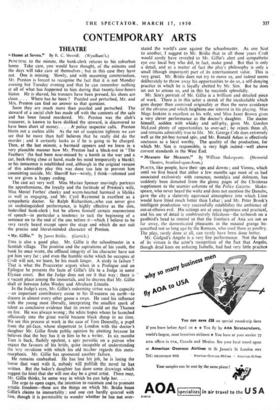CONTEMPORARY ARTS
THEATRE
“ Home at Seven." By R. C. Sherriff. (Wyndham's.) PUNCTUAL to the minute, the bank-clerk returns to his suburban home. Take care, you would have thought, of the minutes and the days will take care of themselves ; but in this case they have not. One is missing. Slowly, and with mounting consternation, Mr. Preston is forced to recognise the fact that it is not Monday evening but Tuesday evening and that he can remember nothing at all of what has happened to him during that twenty-four-hours hiatus. He is shaved, his trousers have been pressed, his shoes are clean. . . . Where has he been? Puzzled and perturbed, Mr. and Mrs. Preston can find no answer to that question.
Soon they are much more than puzzled and perturbed. The steward of a social club has made off with the contents of the safe and has been found murdered. Mr. Preston was the club's treasurer, is known to have disliked the steward, is discovered to have been short of money. . . A police inspector calls. Preston blurts out a useless alibi As the net of suspicion tightens we can see that he more than half believes that he really did do the murder ; and it certainly looks as if he is going to be charged. Then, at the last minute, a barmaid appears and we learn in a very plausible manner how Mr. Preston had a black-out in 'The Feathers ' (he had been near-missed by a bomb in the war and a car, back-firing close at hand, made his mind temporarily a blank); so his innocence is established and, although in the original version of this admirable play this was done too late to prevent him committing suicide, Mr. Sherriff has—wisely, I think—relented and we are given a happy ending.
The cast act very well. Miss Marian Spencer movingly portrays the apprehensions, the loyalty and the fortitude of Preston's wife, Miss Mefiel Forbes' cheeky and warm-hearted barmaid is lifelike as well as engaging, and Mr. Cyril Raymond is excellent as a sympathetic doctor. Sir Ralph Richardson,*who can never give an undistinguished performance, is highly effective as the dim, bedevilled bank-clerk ; but he allows himself certain mannerisms of speech—in particular a tendency to tack the beginning of a sentence on to the end of the one before it—which I believe to be very rarely heard except upon the stage and which do not suit the precise and literal-minded character of Preston.


































 Previous page
Previous page